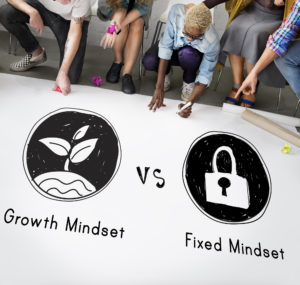Growth vs. Fixed Mindset in Kids and Adults

One of the most basic beliefs we carry about ourselves has to do with how we view our personality. You may have heard your child say something along the lines of, “Oh, I’m just not a math person,” or, “Organization isn’t my thing.” You may even recognize these types of attitudes in yourself. This is what’s known as a “fixed mindset,” a concept that originated in the book Mindset: The New Psychology of Success by Carol Dweck.
In this interview, Elaine is joined by co-host Diane Dempster and special guest Maggie Wray to discuss the difference between a “growth” and “fixed” mindset in kids.
Someone with a “fixed mindset” assumes that their character, intelligence and creative ability has a peak, as someone might reach their maximum height.
“They have this idea that their abilities are fixed and there’s nothing they can do about it,” says Maggie. “That’s going to carry with it a lot of changes in their attitude. They’re not going to want to challenge themselves.”
Diane adds, “You avoid things that you’re not great at. You’ll say something to yourself like, ‘I’m not good at it, I’m not gonna try it. It’s not worth it.’”
In contrast, someone with a “growth mindset” believes that skills are developed through effort; that you learn an ability the way you build muscle at the gym. People with this mindset aren’t discouraged by failure. Rather, they see it as a learning opportunity.
From these two mindsets, which we manifest from a very early age, spring a great deal of our behavior, our relationship with success and failure and, ultimately, our capacity for happiness.
The good news for those with a “fixed mindset” (and yes, there is good news), is that a fixed mindset is not necessarily fixed – it can shift and grow as it is influenced by life’s experiences.
In this conversation, Elaine, Diane and Maggie discuss ways that you might develop and shift toward a “growth mindset” if that’s a direction you’d like to grow –- or how you might help your kids move in that direction. Changing your own “fixed mindset” can have a positive impact on your child’s mindset as it develops, specifically when it comes to failure.
“If (parents) respond negatively to their kid’s failures, that’s going to shift their kid into more of a fixed mindset...Because what does that kid conclude? That mistakes are bad,” says Maggie. And if mistakes are bad, kids are going to avoid trying new things out of fear of failure.
Instead, simple acts like praising your child’s effort in an effective way and empathizing with their frustrations can work wonders toward shifting that paradigm.
This conversation is compelling and truly fascinating. We hope you’ll take twenty minutes to learn more about “fixed” and “growth” mindsets in kids and adults, and how you can tweak and rewire your habits to nourish your child’s mindset. Your beliefs and the stories you tell yourself can either prevent change from happening, or allow new skills to develop -- and it’s all within your grasp.
Worry not. Help is here!
The Secret’s Out: Complex Kids do NOT have to be such a challenge anymore!
Join us as we reveal proven methods for turning chaos into calm.

